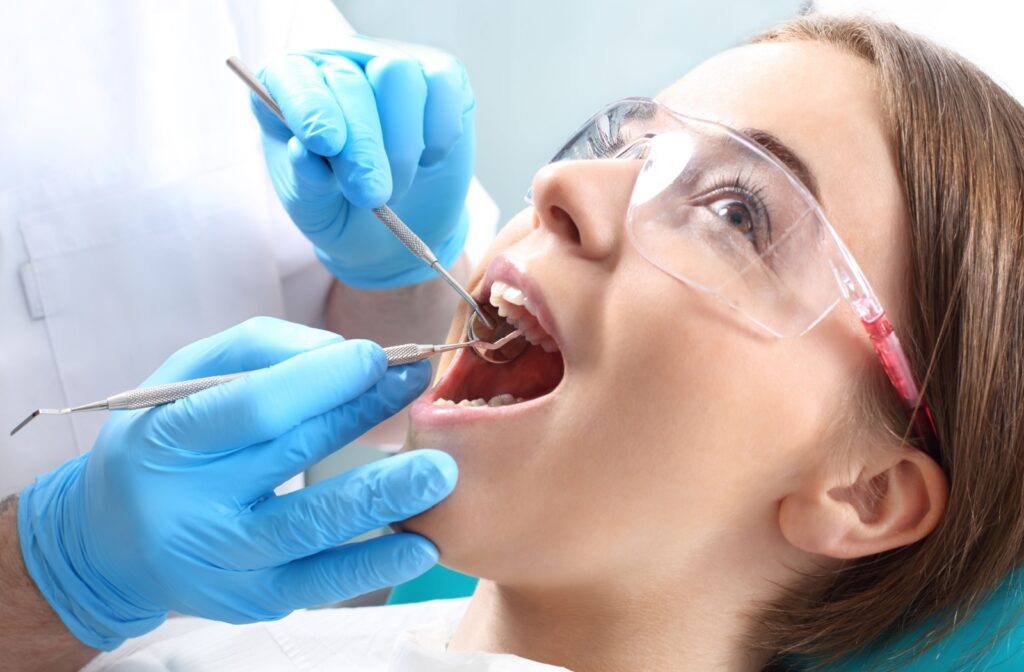Understanding the time investment for maintaining your oral hygiene is crucial since it plays a vital role in keeping your teeth and gums healthy.
Regular dental cleanings are a must for everyone, and often, concerns regarding the duration of these appointments can factor into scheduling them. We’ll address common questions and dispel myths about the time commitment required for a proper dental cleaning. The average time of a dental cleaning is between 30 and 60 minutes.
The Dental Cleaning Process
A dental cleaning typically involves several steps. Here’s what you can expect:
Oral Examination
Before the actual cleaning begins, the dental hygienist will examine your mouth to assess your oral health. This could also include dental X-rays if necessary. This step is crucial in identifying any potential issues or concerns that may require further attention.
Plaque & Tartar Removal
Using specialized tools, such as a scaler, the hygienist gently scrapes away plaque and tartar from the teeth surfaces, especially targeting areas beneath the gum line. Plaque is a sticky film of bacteria that can build up on teeth and cause cavities, while tartar is hardened plaque that cannot be removed by brushing or flossing.
Tooth Polishing
After removing tartar, the hygienist uses a high-powered brush and gritty toothpaste to polish your teeth, leaving them feeling smooth and clean. This also helps to remove any remaining plaque or stains on the teeth.
Fluoride Treatment
A fluoride treatment is typically applied after polishing, which helps to strengthen and protect your teeth against tooth decay. The fluoride is usually in the form of a gel, foam, or varnish that is applied to the teeth and left on for a few minutes.
Flossing
The final step is a thorough flossing to remove any leftover plaque or toothpaste from between your teeth. However, for at-home care, be sure to floss before you brush.
Each of these steps serves an essential purpose in maintaining your oral health and preventing future dental issues.
Factors Influencing Dental Cleaning Duration
Several factors can influence the time your dental cleaning takes:
- Individual oral health condition: Patients with good oral hygiene may require less time.
- Gum disease or other issues: Those with gum disease or extensive dental work may need a longer appointment that may even include freezing.
- Level of tartar buildup: More tartar means more scraping, which can extend the duration.
- Patient cooperation: Movement or the need for breaks can influence the overall time spent in the chair.
Average Length of a Dental Cleaning
For most people, regular dental cleaning will take anywhere from 30 to 60 minutes. However, if you’ve got significant tartar buildup or gum disease, it could extend beyond that.
Occasionally, patients might need a deep cleaning, also known as scaling and root planing. This procedure is more intensive and typically requires at least an hour or more, and it may take place across multiple visits.
Tips for a Smooth & Efficient Dental Cleaning
Want to make sure your dental cleaning is as efficient as possible? Here are a few tips:
- Prepare for the appointment: Arriving on time with your paperwork in order can streamline your visit.
- Maintain good oral hygiene: Brushing and flossing regularly at home will minimize tartar buildup.
- Communicate concerns: If you have issues like teeth sensitivity, let your hygienist know beforehand.
Overall Health Benefits
Maintaining good oral hygiene can also have positive effects on your overall health. Studies have shown that poor dental health is linked to various health issues, such as heart disease, diabetes, and even cancer. Regular dental cleanings can help prevent these potential risks and keep your mouth and body healthy.
Oral Hygiene Education
During your dental cleaning, your hygienist may also provide you with valuable education on how to properly care for your teeth at home. This can include demonstrating techniques for brushing and flossing effectively, as well as recommending oral hygiene products that may be beneficial for your specific needs.
Early Identification of Dental Issues
Regular dental cleanings, in combination with x-rays, not only help prevent dental problems but also allow your dentist to identify and address any potential issues early on. This can save you from more extensive and expensive treatments in the future.
Stain Removal
During a dental cleaning, your hygienist will also remove surface stains from your teeth. Things like coffee, tea, or tobacco use may cause these stains. While a regular toothbrush may not be able to remove these stains effectively, a professional cleaning can leave your teeth looking brighter and healthier.
Fresh Breath
Bad breath can often be an embarrassing problem, but regular dental cleanings can help combat it. Bacteria and food particles that are left behind after meals can cause foul odours in the mouth. A thorough cleaning removes these substances and leaves your mouth feeling fresh and clean.
Gum Disease Prevention
Regular dental cleanings are also important for preventing gum disease. Plaque buildup can lead to inflammation of the gums, which can eventually progress to periodontitis if left untreated. This can lead to gum recession or loss, tooth mobility, and even tooth loss. A professional cleaning removes plaque and tartar from the gum line, reducing the risk of developing gum disease.
Whiter Teeth
Along with keeping your gums and teeth healthy, regular dental cleanings can also help improve the appearance of your smile. Over time, teeth can become stained from foods, drinks, and habits like smoking. A professional cleaning removes surface stains and polishes the teeth, giving you a brighter smile.
Cost Savings
By scheduling routine dental cleanings, you may be able to save money in the long run by preventing more serious dental problems from developing. Neglecting regular cleanings can lead to issues such as tooth decay, gum disease, and the need for more extensive and costly treatments.
Personalized Treatment Plan
Every individual’s oral health needs are different. By regularly attending dental cleanings, your dentist can create a personalized treatment plan that addresses any specific concerns you may have. This could include recommendations for at-home care or particular products you may require.
Schedule a Dental Cleaning in False Creek
The dental cleaning duration may vary based on specific circumstances, but the importance of these regular cleanings can’t be overstated. If it’s time for your next cleaning, don’t hesitate to schedule an appointment today with the team at False Creek Dental. Your oral health is worth every minute.



